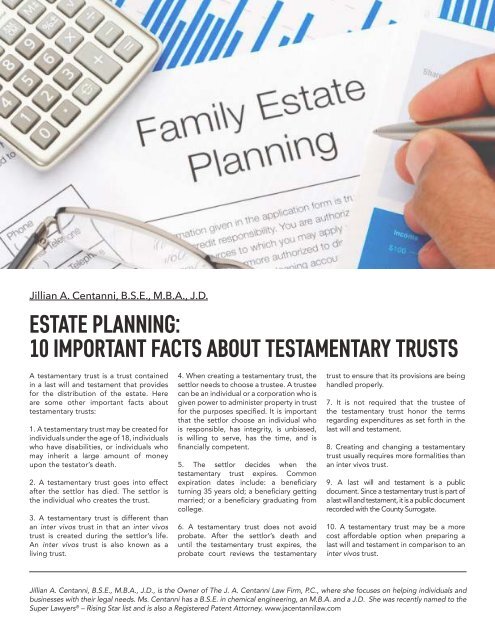24/Seven October 2017
Change Your Attitude...Change Your Life 24 Seven is a digital magazine that provides readers with the tools needed for personal growth, professional development, and self-empowerment. Each month, nationally recognized experts and leaders in their field, provide advice in areas such as spirituality, self-help, personal finance, health, wellness, and business.
Change Your Attitude...Change Your Life 24 Seven is a digital magazine that provides readers with the tools needed for personal growth, professional development, and self-empowerment. Each month, nationally recognized experts and leaders in their field, provide advice in areas such as spirituality, self-help, personal finance, health, wellness, and business.
Create successful ePaper yourself
Turn your PDF publications into a flip-book with our unique Google optimized e-Paper software.
Jillian A. Centanni, B.S.E., M.B.A., J.D.<br />
ESTATE PLANNING:<br />
10 IMPORTANT FACTS ABOUT TESTAMENTARY TRUSTS<br />
A testamentary trust is a trust contained<br />
in a last will and testament that provides<br />
for the distribution of the estate. Here<br />
are some other important facts about<br />
testamentary trusts:<br />
1. A testamentary trust may be created for<br />
individuals under the age of 18, individuals<br />
who have disabilities, or individuals who<br />
may inherit a large amount of money<br />
upon the testator’s death.<br />
2. A testamentary trust goes into effect<br />
after the settlor has died. The settlor is<br />
the individual who creates the trust.<br />
3. A testamentary trust is different than<br />
an inter vivos trust in that an inter vivos<br />
trust is created during the settlor’s life.<br />
An inter vivos trust is also known as a<br />
living trust.<br />
4. When creating a testamentary trust, the<br />
settlor needs to choose a trustee. A trustee<br />
can be an individual or a corporation who is<br />
given power to administer property in trust<br />
for the purposes specified. It is important<br />
that the settlor choose an individual who<br />
is responsible, has integrity, is unbiased,<br />
is willing to serve, has the time, and is<br />
financially competent.<br />
5. The settlor decides when the<br />
testamentary trust expires. Common<br />
expiration dates include: a beneficiary<br />
turning 35 years old; a beneficiary getting<br />
married; or a beneficiary graduating from<br />
college.<br />
6. A testamentary trust does not avoid<br />
probate. After the settlor’s death and<br />
until the testamentary trust expires, the<br />
probate court reviews the testamentary<br />
trust to ensure that its provisions are being<br />
handled properly.<br />
7. It is not required that the trustee of<br />
the testamentary trust honor the terms<br />
regarding expenditures as set forth in the<br />
last will and testament.<br />
8. Creating and changing a testamentary<br />
trust usually requires more formalities than<br />
an inter vivos trust.<br />
9. A last will and testament is a public<br />
document. Since a testamentary trust is part of<br />
a last will and testament, it is a public document<br />
recorded with the County Surrogate.<br />
10. A testamentary trust may be a more<br />
cost affordable option when preparing a<br />
last will and testament in comparison to an<br />
inter vivos trust.<br />
Jillian A. Centanni, B.S.E., M.B.A., J.D., is the Owner of The J. A. Centanni Law Firm, P.C., where she focuses on helping individuals and<br />
businesses with their legal needs. Ms. Centanni has a B.S.E. in chemical engineering, an M.B.A. and a J.D. She was recently named to the<br />
Super Lawyers ® – Rising Star list and is also a Registered Patent Attorney. www.jacentannilaw.com


















